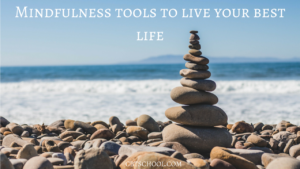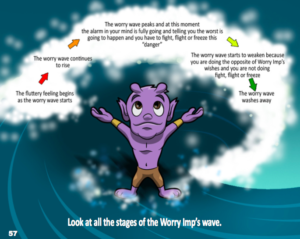
Well folks! Welcome back to another episode of Your Anxiety Toolkit. Today, we have another amazing guest interview as a part of our “We can do hard things” series. I am so excited to share with you an amazing interview with Cami Julaine, an avid mental health advocate, blogger, singer, actor and all-around wonderful person. In this week's episode, Cami shares her journey through Obsessive Compulsive Disorder, an Eating Disorder, Trichotillomania, Panic Attacks and Trauma.
One of the things I love the most about Cami is that she is so authentic and open. I know we all struggle with finding the motivation to keep moving forward sometimes, as managing Anxiety Disorders such as Panic Disorder, Obsessive Compulsive Disorder (OCD), Social Anxiety, Phobias, Health Anxiety can be very difficult. Cami shares with us a inspiring story of how she went from rock bottom to taking bold steps towards her recovery. Cami shares her story of being supported by family members and close friends (ahem, Paula Abdul) who urged her to get help.
This is an incredibly interesting and informative interview, as Cami shares how she had to blend many types of tools (and therapy) to get her to where she is today. Cami shares some wonderful mindfulness tools to help manage Panic Disorder and Panic Attacks. You will really love these tools, as they are very similar to ones we have discussed in previous episodes of Your Anxiety Toolkit, with a little Cami Juliane-twist. :) Cami also talks about her experience with Cognitive Behavioral Therapy (CBT) and Exposure and Response Prevention (ERP).
Finally, Cami shares with us how she has integrated spirituality with her recovery and how she practices self-care and self-compassion as a part of that practice. This is a topic that I have’t touched upon much at all and I am sure you will find it inspirational and validating.
You can find Cami Julaine on Instagram @camijulaine and more information on her website here.
One thing before we say goodbye. GET READY...because ERP School (our online course for Exposure & Response Prevention for Obsessive Compulsive Disorder and other Anxiety Disorders) is COMING SOON, so stay tuned. Sign up HERE to be on the waitlist and be alerted as soon as it is available. PS: The first 20 people to sign up get a free, exclusive “We Can Do Hard Things Meditation” that you can download and use as often as you like. YES!
You Can Be Anxious AND Have Courage!
Courage. Where do we find it? How do we get it? And, once we get it, how do we keep it?
In this era, being courageous or brave comes with great expectations. Men are expected to show their “brave face” ALL the time, or they run the risk of being called a “sissy.” That is a lot of pressure! Women (and many times men too) are expected to multi-task multiple difficult things at once, but also must look pretty and be smiling while doing it.
But, to top it all off, we humans (men, women and children) with anxiety are often expected to meet all of the above criteria AND keep our anxiety to ourselves. Where did we get this from?! I cannot tell you how many times I have heard stories about family members or partners or parents who have told someone struggling with anxiety or depression (or another mental health struggle) to “be braver” or “toughen up” or “you gotta be stronger through this.” While I do understand what they are trying to convey, today’s podcast episode is all about approaching courage and bravery with a new (more reasonable) perspective.
You see, I like to think of bravery and courage as something you can experience WITH anxiety. I actually think they go beautifully together. We can feel dreadful fear AND be courageous. We can feel overwhelming sadness AND be strong. What we have been told about bravery and courage is all off. It limits us and makes us feel like we must not try things until we have no fear and we can “hold it together.”
I like to believe that the person who decided to go to the party, despite their tremendous social anxiety, is the brave one. I believe that the person who does that really hard thing (even if it happens to be easy for other people) is the courageous one. I believe the one who has a tear running down their face as they face their fear is a brave rock star!
I hope you enjoy this podcast episode and begin to challenge your view of what bravery and courage looks like. As always, thank you for supporting me with this podcast and with CBT School's online courses.
Enjoy!
Value-Based Living
Hello there CBT School Family Welcome to another episode of Your Anxiety Toolkit Podcast. As you may know, each week I do my best to bring you a new tool or idea for you to put in your toolkit, in hope that it will give you some skills to manage anxiety, panic and other difficult thoughts, feelings and sensations. I always envision that I am slowly handing you one tool after another and that you are carefully packing those tools into your toolkit or tool belt, so that you feel ready to face your day, with or without anxiety. This week, I want to discuss with you your metaphorical toolkit; the box or belt in which you hold dear to your heart and use daily to help you live your best life. The most important thing to understand in today’s podcast is that carrying a tool belt/toolbox/toolkit is a choice. Every week, you freely join me for a weekly discussion about recovery and living a great life, while having anxiety. You don’t have to carry your toolkit and all the tools around. Many choose not to carry a tool belt or any tools. But you, you do. It’s pretty cool if you ask me. You see, the tools your put in your toolkit are your mindfulness skills. Your toolkit, the place you hold these tools, is your values. If you are on a mission to be a better human, you obviously value your wellbeing. It is a value that you stand by. You value your recovery. You value your quality of life. Using these tools of yours contributes to value-based living. Values are very important to our recovery. The only problem is, that sometimes fear can come in and stomp all over our values. Sometimes fear can lead us away from our values and away from our toolkit. Sometimes fear can lead us towards other problematic behaviors, such as compulsions including checking, counting, avoidance, reassurance seeking and mental rumination. Fear can also lead us towards anger and saying mean things to ourselves. Today, we talk about identifying our values and ways to use the tools you have to help you lead with values. We use concepts from Acceptance & Commitment Therapy, also knows as ACT. ACT is a very helpful treatment modality that beautifully compliments Cognitive Behavioral Therapy (CBT) and Exposure & Response Prevention (ERP). I hope you find it helpful! Forward we go, Kimberley
Welcome to another episode of Your Anxiety Toolkit Podcast. As you may know, each week I do my best to bring you a new tool or idea for you to put in your toolkit, in hope that it will give you some skills to manage anxiety, panic and other difficult thoughts, feelings and sensations. I always envision that I am slowly handing you one tool after another and that you are carefully packing those tools into your toolkit or tool belt, so that you feel ready to face your day, with or without anxiety. This week, I want to discuss with you your metaphorical toolkit; the box or belt in which you hold dear to your heart and use daily to help you live your best life. The most important thing to understand in today’s podcast is that carrying a tool belt/toolbox/toolkit is a choice. Every week, you freely join me for a weekly discussion about recovery and living a great life, while having anxiety. You don’t have to carry your toolkit and all the tools around. Many choose not to carry a tool belt or any tools. But you, you do. It’s pretty cool if you ask me. You see, the tools your put in your toolkit are your mindfulness skills. Your toolkit, the place you hold these tools, is your values. If you are on a mission to be a better human, you obviously value your wellbeing. It is a value that you stand by. You value your recovery. You value your quality of life. Using these tools of yours contributes to value-based living. Values are very important to our recovery. The only problem is, that sometimes fear can come in and stomp all over our values. Sometimes fear can lead us away from our values and away from our toolkit. Sometimes fear can lead us towards other problematic behaviors, such as compulsions including checking, counting, avoidance, reassurance seeking and mental rumination. Fear can also lead us towards anger and saying mean things to ourselves. Today, we talk about identifying our values and ways to use the tools you have to help you lead with values. We use concepts from Acceptance & Commitment Therapy, also knows as ACT. ACT is a very helpful treatment modality that beautifully compliments Cognitive Behavioral Therapy (CBT) and Exposure & Response Prevention (ERP). I hope you find it helpful! Forward we go, Kimberley
Surfing the Worry Imp's Wave
 In this week's episode of Your Anxiety Toolkit, I had the pleasure of talking to Sharon Selby, Marriage and Family Therapist and Author. Sharon has written an amazing children’s book called Surfing the Worry Imp’s Wave and this book is simply amazing.
In this week's episode of Your Anxiety Toolkit, I had the pleasure of talking to Sharon Selby, Marriage and Family Therapist and Author. Sharon has written an amazing children’s book called Surfing the Worry Imp’s Wave and this book is simply amazing.
Before you turn away thinking, “This doesn’t apply to me. This is about kids stuff!”, wait up! Since reading Surfing the Worry Imp’s Wave, I have been using these techniques with some of my adult clients and they LOVE them too. This episode brings some helpful tools and tricks to manage anxiety and perfectionism (at any age). Surfing the Worry Imp’s Wave is a science-based book using the same mindfulness tools and Cognitive Behavioral Therapy (CBT) tools I use with some of my clients and members of the CBT School Campus with Obsessive Compulsive Disorder (OCD), Generalized Anxiety Disorder (GAD), Panic Disorder, Health Anxiety, Social Anxiety and Phobias.
During the episode, Sharon discusses her inspiration behind the book, her work with young children who have anxiety and what tools she has found to be super helpful. As I mentioned about, I have found that these tools are helpful for us BIG kids too (adults). Sharon also tells us about some of the games involved in the books and some helpful tools to manage fear, perfectionism, separation anxiety, and panic.
You guys know how much I LOVE a good story or metaphor, and there are plenty in this book. Here is one I want you to think about. In the book, Sharon talks about how our brains need to make mistakes to grow. If we make a mistake, it is like water on a plant. Mistakes help our brains grow into smarter and kinder people. I just adore this part of the book and it is something I have implemented with my young (and old) clients (and me too!). When I make as mistake, I now close my eyes and imagine my brain neurons growing and thriving. This is just one of the wonderful tools that Sharon talks about.
I cannot wait for you to listen to this week's podcast, and read this book. Surfing the Worry Imp’s Wave is a bookshelf must have, if you have kids with anxiety. But don’t forget, THIS big kid loves it too!!!
See the link below to get your hands on Surfing the Worry Imp's Wave:
https://www.sharonselby.com/product/surfing-worry-imps-wave-reducing-childrens-anxiety Sharon Selby's free e-book 8 Common Mistakes to Avoid When Your Child Is Anxious is available at: sharonselby.com/free-ebook You can also hear more about Sharon on her Website HERE